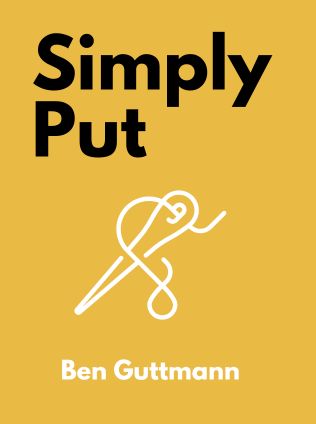
Simply Put
Why Clear Messages Win - and How to Design Them
By Ben Guttmann
Published 10/2023
About the Author
Ben Guttmann is a seasoned expert in communication and marketing. Throughout his career, he has grappled with a fundamental question: "Why do some messages work when others don’t?" His deep dive into this inquiry has culminated in the creation of "Simply Put: Why Clear Messages Win―and How to Design Them." Guttmann’s work spans the realms of science, history, and modern business practices, and he has made it his mission to harness the power of simplicity to connect and communicate more effectively. His insights are invaluable for anyone looking to break through the noise in a world full of complexity.
Main Idea
The central premise of "Simply Put" is that simple messages are the most effective. Guttmann argues that simplicity in communication—being easily perceived, understood, and acted upon—is the key to connecting with an audience. He identifies the attributes of successful messages and provides a toolkit for developing clear, impactful communication.
Table of Contents
- Introduction
- Why Simple Wins
- Our Stupid Brains in Our Busy World
- The Case for Simplicity
- The Crime of Complicated
- How to Get Simple
- Beneficial: The Hole, Not the Drill
- Focused: Fighting the Frankenstein Idea
- Salient: Constraints Breed Creativity
- Empathy: Welcoming the Enlightened Idiot
- Minimal: Say Shit without the Bullshit
Why Simple Wins
Simplicity is the essence of effective communication. Guttmann explains that simple messages are beneficial, focused, salient, empathetic, and minimal. These attributes ensure that the message is easily perceived, understood, and acted upon. Simplicity requires making hard choices and sacrifices, but it ultimately leads to better results.
"Simple messages have five attributes: beneficial, focused, salient, empathetic, and minimal." - Ben Guttmann
In the battle for simplicity, we often encounter the nemesis of complexity. Guttmann highlights how our natural bias towards adding more can lead us into the trap of overcomplication. We tend to believe that adding more details and elements makes a message stronger, but in reality, it dilutes the core message and makes it harder for the audience to grasp.
One of the key reasons why simple messages win is their ability to cut through the noise. In a world where we are bombarded with countless messages every day, only the clearest and most straightforward messages stand a chance of being noticed and remembered. Guttmann emphasizes that simplicity is not about dumbing down the message, but about distilling it to its most essential and powerful elements.
Our Stupid Brains in Our Busy World
Our brains are not perfect machines; they are prone to errors and biases. In a world overloaded with information, our attention is scarce and precious. Guttmann highlights that we filter out unnecessary details to survive, but this makes it challenging for marketers to capture our attention. To communicate effectively, we must understand these limitations and work within them.
- Our attention is limited and finite.
- Memory capabilities are brief and decay quickly.
- We live in a world designed for distraction.
"We ignore and forget because it helps us live our lives." - Ben Guttmann
Guttmann explains that our brains have evolved to filter out most of the information that we encounter. This filtering mechanism, while essential for our survival, poses a significant challenge for communicators. The vast majority of messages we receive are ignored or quickly forgotten because they do not align with our immediate goals or interests. As communicators, we need to recognize that our audience's attention is a precious resource that must be earned and respected.
Moreover, Guttmann points out that our memory is not as reliable as we might like to think. The stages of memory—sensory, short-term, and working memory—are all limited in capacity and duration. This means that even when we do manage to capture someone's attention, there is no guarantee that the information will be retained for long. Our messages need to be designed with these limitations in mind, ensuring that they are not only attention-grabbing but also easy to remember.
The Case for Simplicity
Simplicity is a proven strategy across various fields, from science to business. Guttmann argues that simplicity works because it is efficient and respects the audience's time and desires. He emphasizes that simple messages are not only effective but also a form of kindness, valuing the receiver’s time and attention.
"Simplicity is a function of what scientists call fluency." - Ben Guttmann
- Perceptual fluency: How easily do we notice things?
- Processing fluency: How easily do we understand things?
Guttmann delves into the concept of fluency, which can be broken down into two main components: perceptual fluency and processing fluency. Perceptual fluency refers to how easily we can notice and perceive a message, while processing fluency pertains to how easily we can understand and interpret it. Both types of fluency are critical for effective communication.
Sign up for FREE and get access to 1,400+ books summaries.
You May Also Like
The Subtle Art of Not Giving a F*ck
A Counterintuitive Approach to Living a Good Life
By Mark MansonRich Dad Poor Dad
What the Rich Teach Their Kids About Money - That the Poor and Middle Class Do Not!
By Robert T. KiyosakiHow To Win Friends and Influence People
The All-Time Classic Manual Of People Skills
By Dale CarnegieQuiet: The Power of Introverts
The Power of Introverts in a World That Can't Stop Talking
By Susan Cain



















